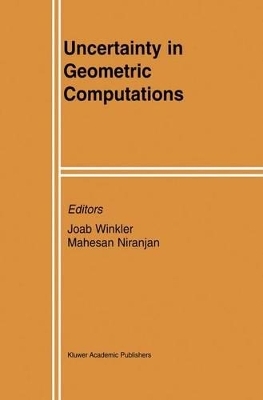
Uncertainty in Geometric Computations
Kluwer Academic Publishers
978-0-7923-7309-4 (ISBN)
- Keine Verlagsinformationen verfügbar
- Artikel merken
Computer simulations and modelling are used frequently in science and engineering, in applications ranging from the understanding of natural and artificial phenomena to the design, test and manufacturing stages of production. This widespread use necessarily implies that a detailed knowledge of the limitations of computer simulations is required. In particular, the usefulness of a computer simulation is directly dependent on the user's knowledge of the uncertainty in the simulation. Typical limitations of computer simulations include uncertainty in the data, parameter uncertainty, errors in the initial data, modelling errors, unmodelled phenomena, reduced order models, and approximations and numerical errors. Although an improvement in the physical understanding of the phenomena being modelled is an important requirement of a good computer simulation, the simulation will be plagued by deficiencies if the limitations listed above are not considered when analyzing its results. Since uncertainties can never be completely eliminated, they must be quantified and their propagation through the computations must be considered.
The uses of computer modelling are diverse, and one particular application, the effect of uncertainty in geometric computations, is considered in this book. In particular, geometric computations occur extensively in geometric modelling, computer vision, computer graphics and pattern recognition. Uncertainty in Geometric Computations contains the proceedings of a workshop that was held in Sheffield, United Kingdom, in which the management and assessment of uncertainty in geometric computations was considered. The theme that unites these four subject areas is the requirement to perform computations on real geometric data, which may have errors, for example, the tolerance of a coordinate measuring machine that is used in reverse engineering, and/or is incomplete because of occlusion, which may occur in computer vision, for example, a face recognition system. These characteristics of real geometric data impose tight constraints on the methods and algorithms that are used for their processing and interrogation, and this workshop provided a forum for their discussion.
One of the novel features of the workshop was the wide background of the audience and invited speakers - applied mathematicians, computer scientists and engineers - and this provided a forum for the establishment of new collaborative links between mathematicians and engineers, thereby emphasizing the interdisciplinary nature of the many outstanding problems.
Contributors and Participants. Preface. 1. Affine Intervals in a CSG Geometric Modeller; A. Bowyer, et al. 2. Fast and Reliable Plotting of Implicit Curves; K. Buehler. 3. Data Assimilation with Sequential Gaussian Processes; L. Csato, et al. 4. Conformal Geometry, Euclidean Space and Geometric Algebra; C. Doran, et al. 5. Towards the Robust Intersection of Implicit Quadrics; L. Dupont, et al. 6. Computational Geometry and Uncertainty; A.R. Forrest. 7. Geometric Uncertainty in Solid Modeling; P.J. Malraison, W.A. Denker. 8. Reliable Geometric Computations with Algebraic Primitives and Predicates; M. Foskey, et al. 9. Feature Localization Error in 3D Computer Vision; D.D. Morris, T. Kanade. 10. Bayesian Analysis of Computer Model Outputs; J. Oakley, A. O'Hagan. 11. b.; T. Poggio, et al. 12. Affine Arithmetic and Bernstein Hull Methods for Algebraic Curve Drawing; H. Shou, et al. 13. Local Polynomial Metrics for kappa Nearest Neighbor Classifiers; R.R. Snapp. 14. Visualisation of Incomplete Data Using Class Information Constraints; Y. Sun, et al. 15. Towards Videorealistic Synthetic Visual Speech; B. Theobald, et al. 16. Properties of the Companion Matrix Resultant for Bernstein Polynomials; J.R. Winkler. 17. Computation with a Number of Neurons; S. Wu, D. Chen. Index.
| Erscheint lt. Verlag | 31.10.2002 |
|---|---|
| Reihe/Serie | The Springer International Series in Engineering and Computer Science ; v. 704 |
| Sprache | englisch |
| Gewicht | 676 g |
| Themenwelt | Informatik ► Theorie / Studium ► Algorithmen |
| Mathematik / Informatik ► Mathematik ► Angewandte Mathematik | |
| Mathematik / Informatik ► Mathematik ► Geometrie / Topologie | |
| ISBN-10 | 0-7923-7309-X / 079237309X |
| ISBN-13 | 978-0-7923-7309-4 / 9780792373094 |
| Zustand | Neuware |
| Haben Sie eine Frage zum Produkt? |